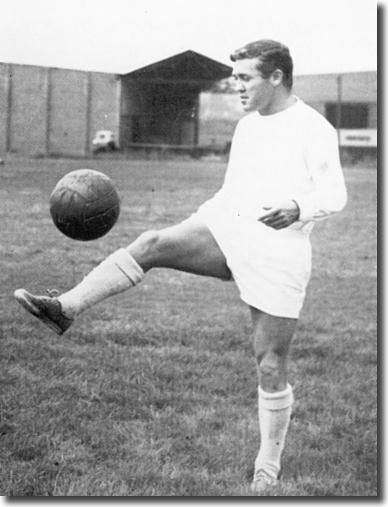 Part
1 An appreciation - Part 2 Home grown hero
- Part 3 From Sweden to Liverpool - Part
5 End of the line
Part
1 An appreciation - Part 2 Home grown hero
- Part 3 From Sweden to Liverpool - Part
5 End of the line
On 3 March 1962, Leeds United were
on the precipice of relegation, struggling at the bottom of Division
Two after just one win in twelve games. Player-manager Don
Revie had decided to hang up his boots, as recalled by goalkeeper
Tommy Younger:
'When I joined Leeds in September, they were something like ten points
worse off than any other team in the League. Don was still playing and,
as I was an outspoken type, I frequently told him: "With the club
in this state, I don't see how you can successfully play and manage at
the same time." He disagreed at first, but soon realised he was trying
to do far too much. I was sitting next to him on the journey back to Leeds
following a 2-1 defeat by Huddersfield, and he told me: "You were
right, Tommy, I've played my last game for Leeds."'
A week later, a new look United eleven met Swansea. Two newcomers, Ian
Lawson, Burnley's reserve forward, and Cliff Mason, Sheffield United's
veteran left-back, both signed before the transfer deadline, were in the
side. Of greater importance, though, was the appearance of a 31-year-old
former Scottish international midfielder. Bobby Collins, newly signed
from Everton, now sported Revie's discarded No 8 shirt.
Lowly United were soon to become one of the most formidable teams in
the country, but for now it was all about survival. Leeds' defeat at Huddersfield,
coupled with a Charlton victory three days later, left United sitting
adrift, two points below the pack, and staring relegation squarely in
the face.
Even for a player as resolute and determined as Collins, this was a daunting
prospect. Nevertheless, the injection of new talent had an instant impact
- the crowd for the match on 10 March against Swansea was more than double
the previous home attendance and Bobby Collins opened the scoring. Centre-forward
Billy McAdams added a second and United had achieved their first victory
in seven matches. They edged off the bottom of the table on goal average,
at the same time dragging Swansea into the relegation mire.
There was a setback the following week when Leeds crashed 4-1 at Southampton,
with 16-year-old Gary Sprake debuting after Tommy Younger withdrew on
the morning of the game with tonsillitis.
That was but a blip - Collins was stirring the spirit and a double from
young Billy Bremner secured a win against Luton before a hard fought goalless
draw at Leyton Orient. Leeds then beat Middlesbrough 2-0 to move three
points clear of bottom placed Brighton.
Bobby Collins saw to it that Don Revie's game plan was followed to the
letter. He introduced a new urgency, demanding that United become the
most difficult of teams to beat, saying later: 'Don and I had the same
outlook on how we should be playing. He wanted me to instil in the players
a never say die attitude throughout a game. The defence had to tighten
up and be disciplined at the back. I sat in the middle of the park, leaving
four in attack, with the wingers coming back to help when necessary.
'Don had been trying these tactics without success, but I made my point
forcibly to the players that this would be our tactics come what may.
Playing as a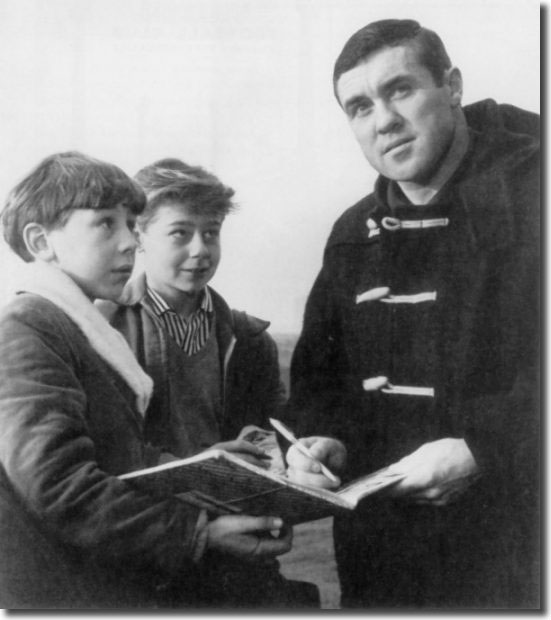 team was the key to survival. This way we would do no worse than draw,
and hopefully snatch a win to avoid relegation.'
team was the key to survival. This way we would do no worse than draw,
and hopefully snatch a win to avoid relegation.'
back to top
Billy Bremner commented on Collins' impact: 'He never gave us a minute,
because he was always telling us to do this, and do that, and do something
else, and go tight there, and give it plenty of room in another place,
and then get everybody running and running … Nobody who knew him can ever
forget him, and the way in which he kept up our spirits when we'd been
beaten, and was always saying there's another time, and knew it because
he'd seen it before.'
The next five games brought five draws - United had conceded just four
goals in eight games, with Jack Charlton restored at centre-half and demonstrating
new found vigour. Leeds had come unscathed through a challenging Easter
and though they would have preferred to see some victories, by 24 April
they had climbed out of the relegation places.
United's final fixture was at Newcastle and they needed a win to ensure
survival. It was a high-pressure game, but Leeds were full of confidence.
They never looked like failing and Albert Johanneson
had a field day, inspiring an easy victory. The first target for Revie
and Collins had been achieved.
Collins: 'We got out of jail with a 3-0 win over Newcastle United on
the last day of the season. That was a great day and the start of the
glory days … Don knew what he was getting when he signed me. He wanted
good pros with good habits and he had a knack of building up comradeship.
We loved him and respected him, though I admit I'm glad I left before
he introduced the team bingo sessions.'
Emboldened by the impact of Collins, Revie and the United directors decided
on another financial gamble in the summer of 1962. Despite the imminence
of impending instalments on a spate of recent transfers, astonishing news
from Italy prompted the board to dig deep once more. Intrigued by a rumour
that former Elland Road favourite John Charles
was reluctant to extend his Juventus contract, the board sanctioned a
bid.
It was a summer of twists and turns, but in the end United got their
man - Charles was on his way back to West Yorkshire after five years of
success in Turin. It took a club record £53,000 fee to secure the deal,
but hopes were high that Charles would spearhead a promotion challenge.
Unfortunately, things did not work out. Five years in the sunshine of
Serie A had made the Welshman a fundamentally different footballer. He
could come to terms with neither the conditions nor the approach that
Revie wanted Leeds to take. He later said: 'The style of play was nothing
like that to which I had become accustomed. Italian football is slower
with a more deliberate build up in midfield … I found it hard to adjust
to the long ball style with players scuttling around at 100 miles per
hour.'
Collins recalls: 'I don't think John was happy when he came to Leeds,
I don't think he was enjoying his football. He certainly wasn't the John
Charles I had seen play for Wales against Scotland at Hampden Park. We
were all waiting for him to do well but it never happened.'
After three goals in 11 games, Charles returned to Italy with Roma pouring
£70,000 back into Elland Road's welcoming coffers. United were twelfth
in the table, but were not despondent.
The goals of former Airdrie inside-forward Jim
Storrie bought the club valuable points as Don Revie gambled on his
nursery. He blooded Paul Reaney, Norman Hunter and Rod
Johnson and gave young Gary Sprake his second start in a
win at Swansea; all but Johnson were fixtures for a decade. Others,
like Jimmy Greenhoff, Peter Lorimer and Mike
Addy, also got their chance.
Collins revelled in this new environment, earning rave 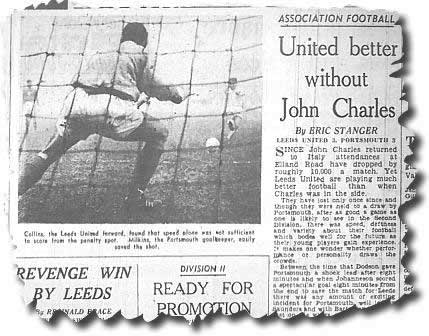 notices
for a string of inspirational performances.
notices
for a string of inspirational performances.
Richard Ulyatt: 'The vastly experienced Collins and the greatly improved
Charlton held United together. Collins got through such a great amount
of work in the first half - back in defence, forward in attack - that
he might have been expected to flag, but at the end he was still going
strong, still half a thought ahead of most other players. It seemed as
though he played strictly to orders, plugging, prompting, urging.'
Bob Russell: 'Classy Collins … tantalising the Newcastle defence with
a deft touch here and a defence splitting through ball there. Cannonball
Collins … popping up suddenly in the penalty area and testing keeper Dave
Hollins to the limit. Courageous Collins … letting his enthusiasm almost
boil over when he "had words" with tall Newcastle centre-half
George Thompson.'
Edgar Turner: 'Man of the match for me was Bobby Collins. I think he
is even better now than when he was with Everton. There was barely a blade
of grass that he didn't either trample down as he scoured the field, or
cut down with his beautiful ground passes. He was everywhere. Sometimes
he was in situations with men looking almost twice his height, menacing
him. But always Bobby came out with a big grin on his face.'
Collins enjoyed an outstanding season as Leeds pressed for an unlikely
promotion, and it was not until a run of three successive defeats in May
that their challenge faded. Phil Brown gave Collins much of the credit:
'He has been the mainspring match after match, and a heck of a lot of
improvement in the other players would not have taken place but for his
unflagging work and his shrewd generalship.'
It was a season of extraordinary progress for Collins and United and
they were soon ready for a real promotion push. In the first weeks of
1963/64, Don Revie recruited
Manchester United winger Johnny Giles to play alongside Collins and Billy
Bremner in a diminutive midfield that formed the platform for a series
of strong performances. By now Bobby Collins had formally assumed the
role of captain, though it made no fundamental difference to his approach.
He was the dominant force, as observed by Phil Brown after one early
victory: 'Leeds United's thanks must go to Bobby Collins. He is not quite
big enough at 5ft 3in for one to say that he bestrides Elland Road like
a colossus but, once more, he played like one in the very satisfying 3-0
home win over Bury. He scored with a typical deceptive long shot after
half an hour when a strong suggestion of stalemate was coming into the
game because of Bury's emphasis on defence; he saw to it that Johnny Giles
worked up from a slow start to a capital debut and he knocked about in
defence when United began to creak, and he made play after play for colleagues
in attack. He got … most of the ovation which the capitally sized 26,000
crowd gave United as they came off, and he deserved such an honour … At
present day valuations and ignoring his age … he must be worth £70,000.
Never in their history have United bought better than he.'
back to top
Eric Stanger observed after the match, '"Stop Collins and you stop Leeds,"
they say in the Second Division. But how? He gets in such out of the way
places that he must be just about the hardest forward in the game to mark.'
Leeds quickly worked their way into a promising position, assuming leadership
of the table by the end of October and thereafter battling all the way
with Sunderland and Preston. The three clubs had the top positions to
themselves to the very end, though they regularly rotated rankings. United
stumbled badly over Christmas in a double header against the Roker club,
getting just a point from the two games and giving way at the top.
In a break from the battle of attrition, Leeds had the chance to prove
themselves against the country's very best when drawn in the FA Cup against
league champions Everton. It was Bobby Collins' first opportunity to play
against his former club since leaving Goodison and he had a point to prove.
The Merseysiders had won the title a year after the Scot's departure to
Elland Road and were among the strongest sides in England, on the way
to a third place finish.
Gary Sprake: 'Don Revie was really worried about the tie, not because
we were playing more illustrious opponents, but because he thought we
would have stage fright. A crowd of over 50,000 was expected and he thought
that we were too young to handle the occasion. Willie
Bell was the oldest defender and he was only 23 … We also had Bobby
Collins, a tremendous competitor and leader of men. He was an ex-Blue
and wanted to show his old club he could still do the business.
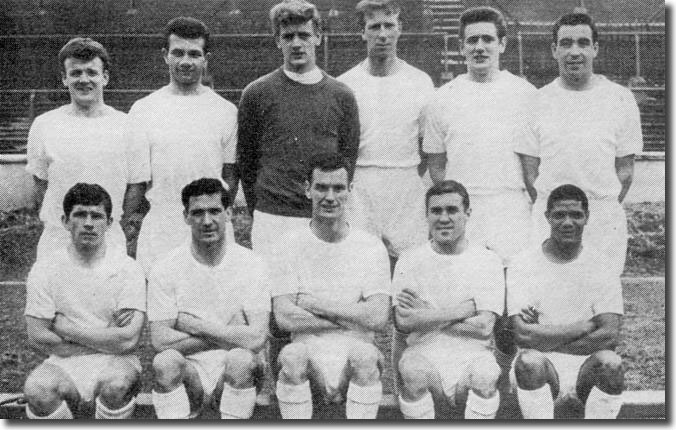 'I
remember the game for its cut and thrust nature and the intimidating noise
generated by the Leeds supporters. It was quite intimidating in the tunnel
for most of us.'
'I
remember the game for its cut and thrust nature and the intimidating noise
generated by the Leeds supporters. It was quite intimidating in the tunnel
for most of us.'
The game ended 1-1, with United denied a shock victory by a twice taken
Scott penalty, resulting in a replay at Goodison.
Collins: 'It was great playing against my former club. I had great memories,
but I wanted to impress and let their manager know he had made a mistake
in letting me go. I was soon in a battle with the guy that replaced me.
He had a go at me and I retaliated. I should have been sent off, but the
referee saw his challenge and let the incident pass. Everton knew they
had been in a battle. They also knew we were an emerging team.'
Back in the league, United returned to form, suffering only one defeat
after the Christmas period, at promotion rivals Preston on 3 March. The
defeat left United second to Sunderland, level on points with North End,
but enjoying a better goal advantage. It was a critical period and Collins'
goal four days later against Southampton inspired Leeds' revival.
Ronald Kennedy: 'The city of Leeds … breathed a sigh of relief in the
72nd minute of this rugged battle … Bobby Collins, a little chunkier and
a little slower than in his heyday, swept away with the ball towards the
left edge of the penalty area. Elland Road groaned because it looked a
thousand to one that wee Bobby had thrown away a golden chance to settle
the Saints' hash once and for all. But suddenly the little general's foot
struck like the tongue of an angry vampire, and the ball tore savagely
into the net.'
Leeds won seven and drew two of their remaining nine games to capture
the title. It had been a remarkable triumph and Collins looked forward
to reappearing at the highest level.
Don Revie acknowledged the Scot's key role: 'In the first season I took
over at Leeds we were heading for the Third Division. Crowds had dropped
to 8,000 … I went out and made the best buy of my life, Bobby Collins.
There were rumours that he had a bad knee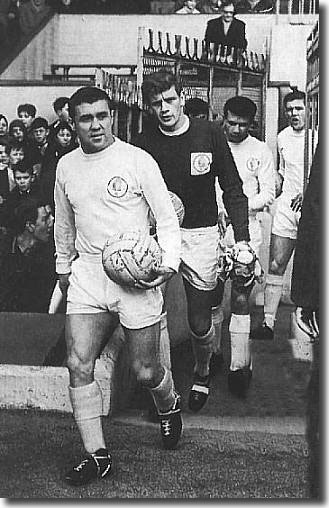 and that at 31 he was on his way out. I had him medically examined and
he proved fully fit. That was enough for me, I didn't doubt his ability.
If there is a better inside-forward in Great Britain, I'd like to see
him. He's one of the all time greats.'
and that at 31 he was on his way out. I had him medically examined and
he proved fully fit. That was enough for me, I didn't doubt his ability.
If there is a better inside-forward in Great Britain, I'd like to see
him. He's one of the all time greats.'
Eric Stanger wrote an end of season valediction on United's triumph in
the Yorkshire Post: 'The benefit of an overall team plan is that
players can step from the junior side to the reserves and to the first
team knowing exactly what is required of them. The club's style and general
tactics are ingrained in them. But in United's case before it could be
fully operative, there had to be a lot of improvisation, and a lot of
make and mend in the first team if relegation to the Third Division were
to be avoided. Of the signings in March 1962, none turned out to be more
important than that of Bobby Collins.
'Collins, whose best days were thought to be over at 30, not only led
them to safety that season but his shrewd generalship and leadership have
been decisive factors in taking them back into the First Division. Few
inside-forwards work harder than Collins and generally they are a hard-working
race - they have to be in the modern game. Few players can strike such
a response from their colleagues.
'His influence both in the dressing-room and on the field has been incalculable.
It may be an overstatement to say that he has made Billy Bremner into
one of the best wing-halves in the country, but not so much so.
'Bremner, I know, has such respect and affection for his fellow Scot
and his football has improved so much under his lead that United, who
could not get £25,000 for him a couple of seasons back, would now not
take double that fee for him.
'Bremner and Collins have formed the hub round which the team has revolved
- the midfield dynamo, as current football phraseology has it. They are
responsible for the quick transformation from defence to attack, which
is so essential if the modern blanket defence system is not to be completely
stultifying.'
Leeds settled remarkably well when stepping up onto the big stage in
1964/65, owing much to their
captain. United beat Aston Villa, champions
Liverpool and Wolves in an opening burst that built confidence amongst
their youngsters and formed the basis of an astonishing season. They stumbled
a little after that, but soon found themselves racing for the title and
hit top spot after a 2-1 victory over Sunderland on 2 January.
It was nothing if not a controversial campaign, and United were never
out of the headlines for their brash and confrontational approach. This
reached a hiatus in early November when Collins took his men to Everton
for another ill-tempered battle
against his former club.
back to top
Collins: 'The clash at Goodison was one of the most ferocious games I
ever played in for Leeds. The tackles were flying in and a section of
fans threw their cushions in the field. The media blamed us, but some
of the Everton players were going over the top time and again. The referee
lost control. It was nasty and at times brutal. There were some horrendous
challenges that day, but it was not in our nature to turn the other cheek.
The goal was crucial. I took a free kick and flipped one in … boomph,
Willie Bell scored with a header. A war of words followed, but eventually
the dust settled. We knew that every game from then on would be judged
more intensely than ever.'
With the regular spearhead, England international Alan
Peacock, missing through injury until February, Don Revie's men were
a team without stars, though it was clear who the leader was. Collins
exhorted the entire team to give of their best and there was a reliance
on everybody to contribute goals - Jim Storrie was the leading scorer
with 16 but Albert Johanneson, Jack Charlton and Collins contributed nine
apiece. None of Bobby's was more important than the one he netted on 5
December against Manchester United, Leeds' main rivals for the title.
It was the only goal of the game.
Rob Bagchi and Paul Rogerson: 'How far ahead of its time this team was
- the modernism of their methods and the crowd reactions they provoked
- is highlighted by Leeds' visit to Old Trafford … Leeds United were the
future of football, the trailblazers of the now ubiquitous 'professionalism'.
No wonder they perturbed so many people.
'Other teams had been just as unpopular with opposition supporters, but
what made this Leeds side so uniquely loathed was how much they managed
to rile opposition players. George Best gives a good example from that
Old Trafford encounter of their adventurous aggression: "As the two
teams walked down the tunnel, I felt a terrific pain in my right calf
as someone kicked me with brute force. I turned. It was Bobby Collins.
'And that's just for starters Bestie,' he said." Reprehensible, obviously,
and entirely contrary to the spirit of the game, but one can't help being
amused by the sheer audacity of the man - and the naked malevolence of
the act.
'Over the next five years, as Manchester United conquered Europe and
George Best was at his peak, he tore countless teams to shreds, but for
all his sublime ability he never once dominated a game against Leeds United.
It wasn't because Best was physically frightened by Leeds, simply that
Leeds were prepared to use every weapon at their disposal to stop him
playing, whether physical, psychological, tactical or, like the tunnel
assault, borderline criminal.
'But it wasn't a cowardly approach. Nobby Stiles, Best's protector-in-chief,
took his team mate's revenge. "Every time you come down our right-hand
side and kick George, you filthy bastard," he shouted at Collins,
slamming him into the perimeter wall in a forceful tackle, "I'm going
to friggin' well hit you like that, only harder." Collins got up
to score the only goal of the game. He had started it, taken the retribution
as fair punishment, continued to hound Best despite Stiles' injunctions
and still led his team to maximum points. That was the hyperactive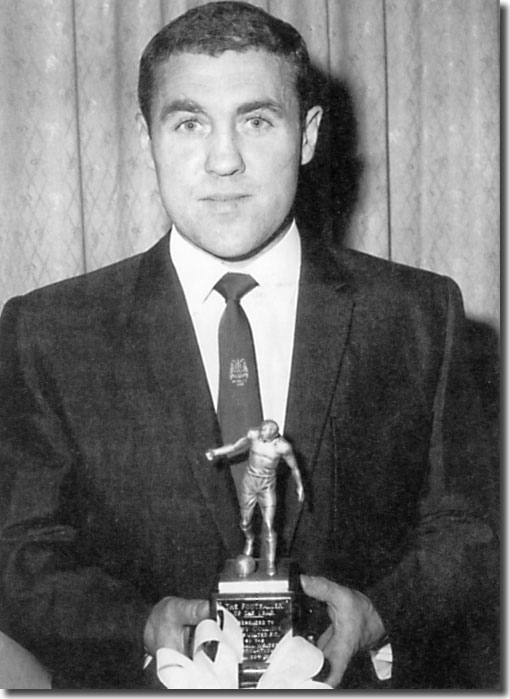 impudence that came to characterise Revie's Leeds.'
impudence that came to characterise Revie's Leeds.'
For all the violence and spite, Bobby Collins was also a superb footballer
and he was receiving rave reviews whenever he played. Even the men from
Manchester acknowledged his impact.
Denis Law: 'Captaincy has … been good for Bobby Collins. On the field
today he is very much the general. All the time he is encouraging his
team, urging them on, dictating the pattern. He wants the ball all the
time, wants to dictate the style. His is flash and bustle, a wee pirate
of a man. To look at Bobby Collins you'd expect him to play it close,
delicate flicks and the like. Yet I know of no one who makes better use
of the long ball to the wing. He can hit them too. Part of his secret
is that he combines the long and the short ball so well that you never
quite know what to expect. He is not as fast as he used to be, but he
compensates for this with added experience and skill. Today I would rate
him in the top six inside-forwards in Britain.'
Matt Busby: 'Whenever I see Bobby Collins of Leeds United, I realise
that the little un can still be a giant on the field. The wee inside-forward
has done more than any Leeds player to lift the club from the depths of
the Second Division to the heights of the First. He looks a happy player.
He is always a tremendous worker, he paces it well, he is inspiring to
younger players and patient with them, too. If young players are impetuous,
he calms them down with a word of advice. If they need pepping up, he
will do that nicely too. Bobby shirks nothing; they never come too big
for him, but it is his football brain that makes him invaluable. He sees
things before they happen as all great players do, or he changes the face
of the game with one sharp move.'
back to top
Leeds combined their unexpected chase for the title with their best ever
FA Cup run. They worked their way through to a semi final confrontation
with Manchester United, battling out a
fierce goalless encounter at Hillsborough, as recalled by Collins:
'The first game was a bit naughty, but that was caused by them; they
started things, but typical of the media at the time Manchester did not
receive the criticism that we would have for employing similar tactics.
There were a number of unsavoury incidents, the worst when Big Jack and
Denis Law clashed. Billy and Pat Crerand got involved in the mix and it
set the tone of the game. It was a terrible pitch and a really tough match.
We were second best before half time but had the edge in the second half.'
The replay was less violent and Leeds
won in the closing seconds with a header from Billy Bremner to earn
their right to a Wembley showdown with Liverpool.
In the end, the Yorkshire club's championship challenge faded in the
wake of an irresistible closing run by the Reds. Before losing their final,
irrelevant fixture at Aston Villa, Manchester had dropped just one point
in 11 games, including a win at Elland Road, scoring 30 goals against
only 5 conceded.
Leeds' chances ended when they could
only draw 3-3 at Birmingham at the start of Cup final week, but Bobby
Collins could at least console himself with his election as Footballer
of the Year by the Football Writers' Association, simultaneously becoming
both the first Scot and the first United player to scoop the award. He
thoroughly deserved the accolade for a remarkable season as noted by Frank
McGhee of the Daily Mirror:
'Off the field I look down on Bobby Collins … literally. On the field
I look up to him in every way. That was the reason why I helped to make
him Footballer of the Year in 1965. Leeds are very significant powers
in the land today and this little man is one very big reason why. He is
sergeant major, captain and general in their army, this scaled down Hercules
… I doubt if any club in post war years had made a bigger mistake than
Everton or a better bargain than Leeds that day. For their money they
bought experience, ability, leadership, knowledge, courage all wrapped
up in one neat tidy package, only five feet three inches high, weighing
only 10 stone 2 pounds, but every inch and ounce is class.'
Strangely, after such a stirring season, the
young United side froze at Wembley, strangely distracted and ineffective,
left chasing Liverpool's shadows. Collins put in his customary hard work,
but his most notable moment was when he clattered into 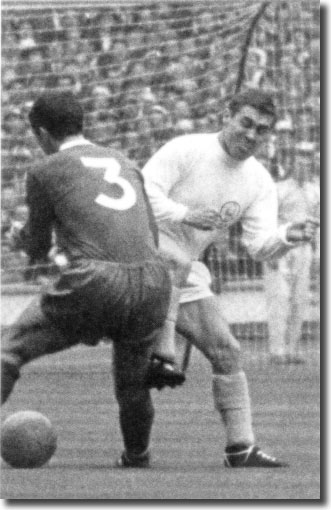 Reds
full-back Gerry Byrne, breaking his collarbone in the process. Byrne played
on, successfully masking his pain. The same could not be said of the hobbling
Jim Storrie, and United never looked like winning the game.
Reds
full-back Gerry Byrne, breaking his collarbone in the process. Byrne played
on, successfully masking his pain. The same could not be said of the hobbling
Jim Storrie, and United never looked like winning the game.
Johnny Giles: 'For once, Leeds' midfield engine failed to fire on all
cylinders. Bobby Collins had a rare off day … no matter how hard he tried,
nothing would go right for him. It's funny, but before the final Bobby
told us that Wembley had always been a bit of a bogey ground for him in
previous years, and he was hoping that his luck would change. You had
to hand it to this fellow. When one is frequently making mistakes it is
difficult to resist the temptation to run away and hide, to shirk responsibility.
Yet Collins played his heart out from start to finish. He never stopped
shouting for the ball … taking up good positions … giving encouragement
to the other Leeds players.'
back to top
Collins had other things to take his mind off the disappointment. He
had been recalled to the international fold for a clash with England in
the self same stadium in April, helping Scotland to a 2-2 draw after falling
two goals behind.
At the time Scotland were in the midst of a World Cup qualifying campaign
in a group with Italy, Poland and Finland and were looking good after
a 3-1 victory against the Finns. Collins was included in the squad for
the end of season internationals: the games in Poland and Finland, plus
a Hampden friendly against Spain.
Billy Bremner made his international debut in the game with Spain on
8 May. It was a rough game that ended goalless, and afterwards manager
Ian McColl was sacked. He was replaced at short notice by Collins' former
Celtic team mate Jock Stein, who retained Bobby for the match against
Poland in Chorzow. In the 76th minute Denis Law equalised Lentner's opener
to earn a point that strengthened the Scots' challenge, matching the Italians'
result of four weeks earlier.
Collins had done well enough, but was rested for the final game, in Helsinki,
watching his colleagues earn a heartening 2-1 victory that left them atop
the group.
For Bobby Collins, the summer of 1965 was an Indian one, indeed. Crowned
the best player in the country, on the verge of another World Cup and
looking forward to his first experience of club competition in Europe,
he was on top of the world, a feted star. It would have been difficult
to imagine how life could have been any sweeter.
Part 1 An appreciation - Part
2 Home grown hero - Part 3 From Sweden to Liverpool
- Part 5 End of the line
back to top











 Part
1 An appreciation - Part 2 Home grown hero
- Part 3 From Sweden to Liverpool - Part
5 End of the line
Part
1 An appreciation - Part 2 Home grown hero
- Part 3 From Sweden to Liverpool - Part
5 End of the line  team was the key to survival. This way we would do no worse than draw,
and hopefully snatch a win to avoid relegation.'
team was the key to survival. This way we would do no worse than draw,
and hopefully snatch a win to avoid relegation.' notices
for a string of inspirational performances.
notices
for a string of inspirational performances. 'I
remember the game for its cut and thrust nature and the intimidating noise
generated by the Leeds supporters. It was quite intimidating in the tunnel
for most of us.'
'I
remember the game for its cut and thrust nature and the intimidating noise
generated by the Leeds supporters. It was quite intimidating in the tunnel
for most of us.' and that at 31 he was on his way out. I had him medically examined and
he proved fully fit. That was enough for me, I didn't doubt his ability.
If there is a better inside-forward in Great Britain, I'd like to see
him. He's one of the all time greats.'
and that at 31 he was on his way out. I had him medically examined and
he proved fully fit. That was enough for me, I didn't doubt his ability.
If there is a better inside-forward in Great Britain, I'd like to see
him. He's one of the all time greats.' impudence that came to characterise Revie's Leeds.'
impudence that came to characterise Revie's Leeds.' Reds
full-back Gerry Byrne, breaking his collarbone in the process. Byrne played
on, successfully masking his pain. The same could not be said of the hobbling
Jim Storrie, and United never looked like winning the game.
Reds
full-back Gerry Byrne, breaking his collarbone in the process. Byrne played
on, successfully masking his pain. The same could not be said of the hobbling
Jim Storrie, and United never looked like winning the game.